When Gatherings Ended, Food Operations Suffered
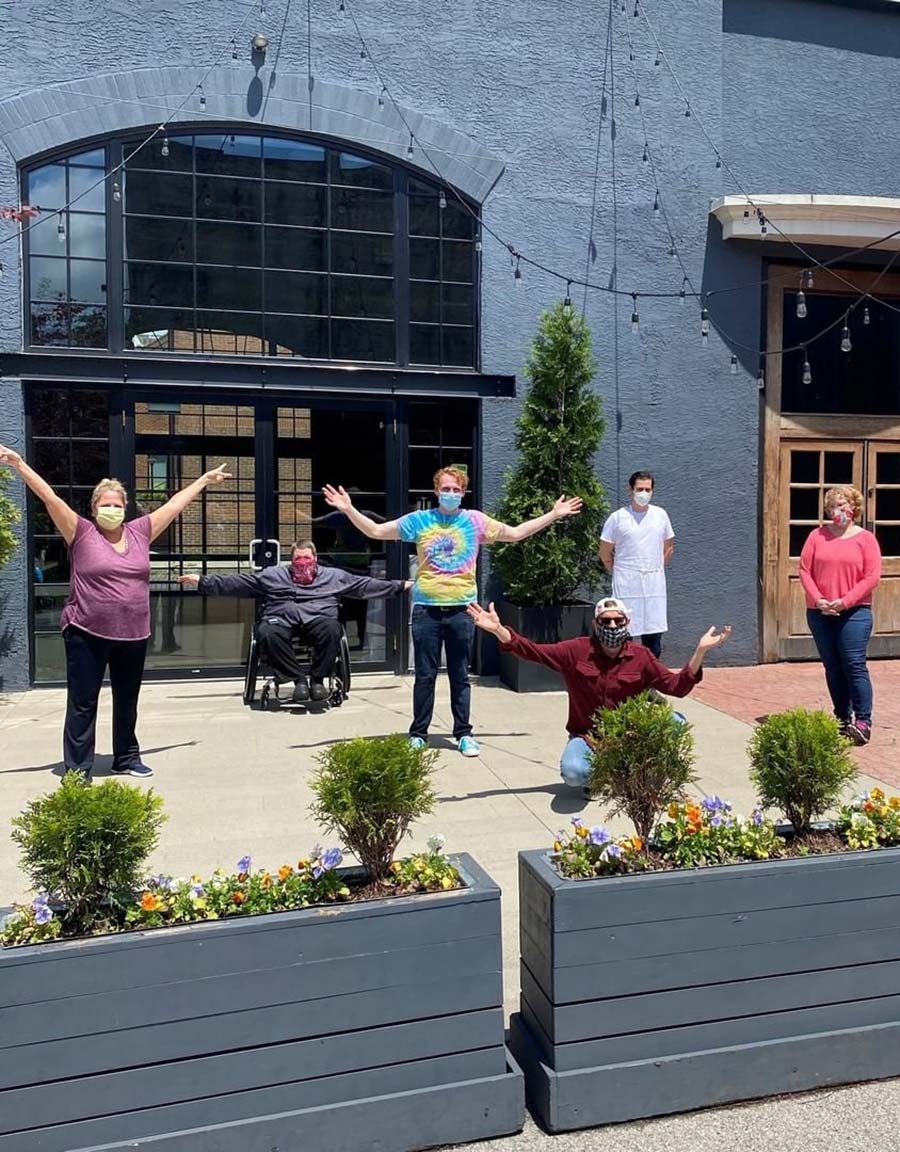
Some of the Together & Co. staff gather outside the company’s Brewery District building. Photo courtesy of Together & Co.
When restrictions were imposed in March because of the pandemic, the first things eliminated were large gatherings. Classrooms and dormitories were closed to avoid crowds of students. The conventions, wedding receptions, proms and graduation parties that are common for the season were banned. By March 22, Ohio said no more than 10 people could be together in one place.
In Columbus, as elsewhere, there is an entire support industry built around large events—venues, tent rentals, DJs, bands, decorations and, above all, food.
Here are the stories of some who were dramatically affected by changes in the way we gather.
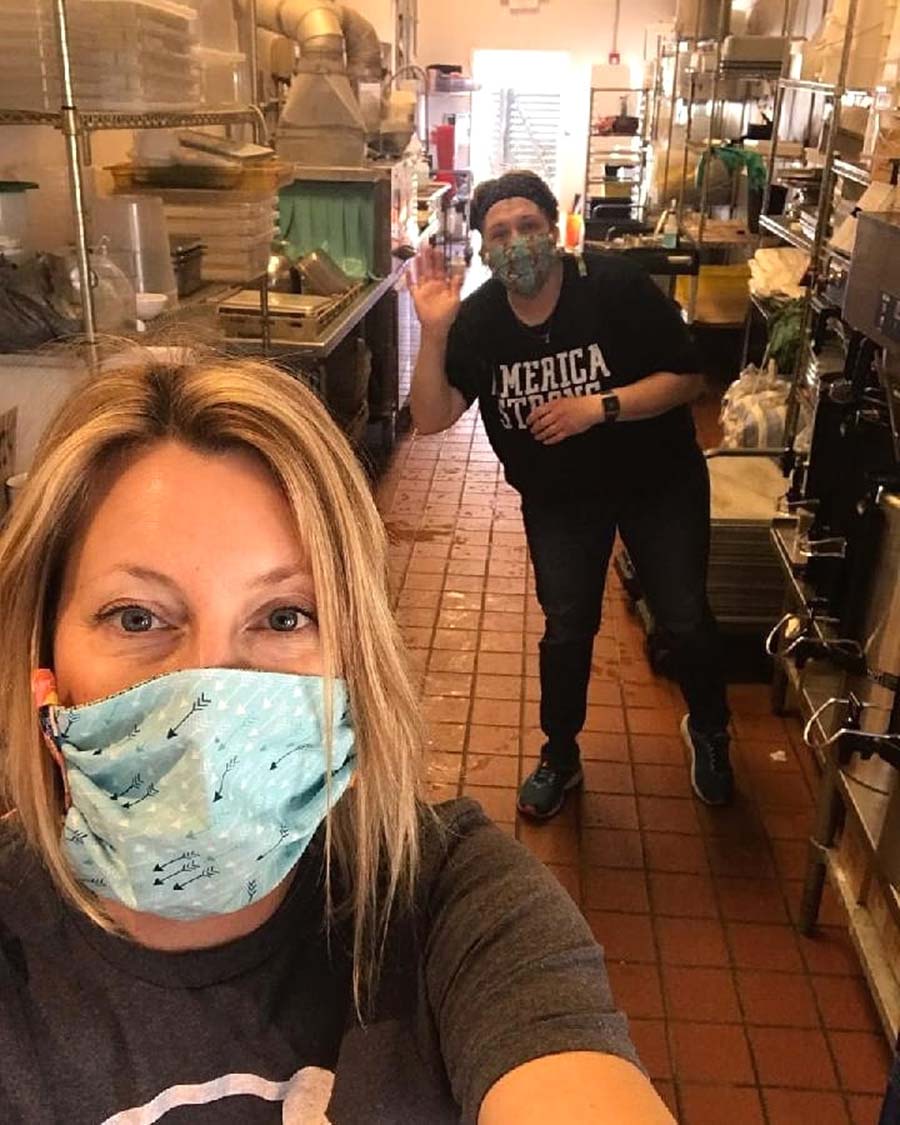
Owner Angela Petro, foreground, takes a selfie with a volunteer to post on Facebook. Photo courtesy of Together & Co.
TOGETHER & COMPANY CATERING
For Angela Petro, 2020 looked like it would be the biggest year yet for Together & Company, the catering operation she started 23 years ago. The schedule was filling up with weddings, awards ceremonies, graduation parties and corporate events.
Ohio State University provided the first warning that things were about to change when officials suspended on-campus classes on March 9—and also canceled all events and catering up to June. “In one day, we lost a quarter of a million dollars of catering, even before the governor issued any guidelines whatsoever,” Petro said.
Within a week, the state banned all public gatherings of more than 50 people and closed all bars and restaurants to in-house patrons. “What started as a trickle quickly turned into a flood,” she said.
Here’s what a flood looks like to this company: 59 scheduled events could not be held in a three-month period, representing $1.5 million in revenue. About 55% of those were postponed to 2021.
For Petro, the worst part was telling nearly 200 employees there was no work for them. “It was honestly the sickest I’ve ever felt in my life,” she said. Because of the nature of the catering business, Together & Company has many part-time employees who work night and weekend events as a second job to make ends meet. Petro knew how hard they would take the news. “It felt like I was tearing down my dream house one board at a time, and every board was a human being who I had a relationship with.”
She could not give them work, but she could give them food. “When you shut your doors and send everyone home, you’re left with tens of thousands of dollars’ worth of perishable product,” she said. Employees were invited to come to the company’s Brewery District facility and pick up food until it was gone. Even now, employees are offered the chance to come and pick up a family meal each Friday.
Still, the company’s leadership team wanted to do more. Petro began working her many community contacts, looking for ways to help those who needed it most. With backing from the Mid-Ohio Food Collective, volunteers from the staff started making meals for the homeless through the Community Shelter Board. “We’ve been making meals five days a week, three meals a day—a shelf-stable breakfast, a hot lunch and a cold sack dinner—and delivering those to two different locations,” she said.
Another layer was added when Michelle Moskowitz Brown, director of Local Matters, came up with grant money to buy food that the Together & Company volunteers turned into meals for the nonprofit Bhutanese Community of Central Ohio and Buckeye Ranch. “It’s selfish, in a way, because doing this makes us feel really good,” Petro said. “It makes us feel useful and it keeps at least part of our team together so that they can still share in a kind of camaraderie through all this.”
Restrictions are beginning to ease in Ohio, but Petro sees a long road ahead for Together & Company and its two related brands. The two locations of Kittie’s Cakes, a bakery and café, are now open for limited hours. Sweet Carrot restaurant in Grandview has offered carryout meals and is looking at opening for two or three days a week. Catering is more of a challenge, because the revenue lost is gone for good. The postponed events are filling up future slots on the schedule. And a socially distanced gathering will be a challenge for everyone involved. “It won’t go back to normal and I think everyone knows that, so we’re going to try and figure it out best we can,” she said.
Petro also has some advice if you want to help restaurants and hospitality businesses to recover: Skip the convenience of delivery apps such as UberEats or DoorDash when you order food. The third-party delivery operations are taking 20% to 30% as their cut of the restaurant order, leaving no profit for the people who make the food. “Get in your car and go to that restaurant and pick your food up and pay them directly. That’s the best way to support them,” she said. “Your money will be going to a restaurant instead of a tech company.”
To learn more about the company, visit togetherandco.com.
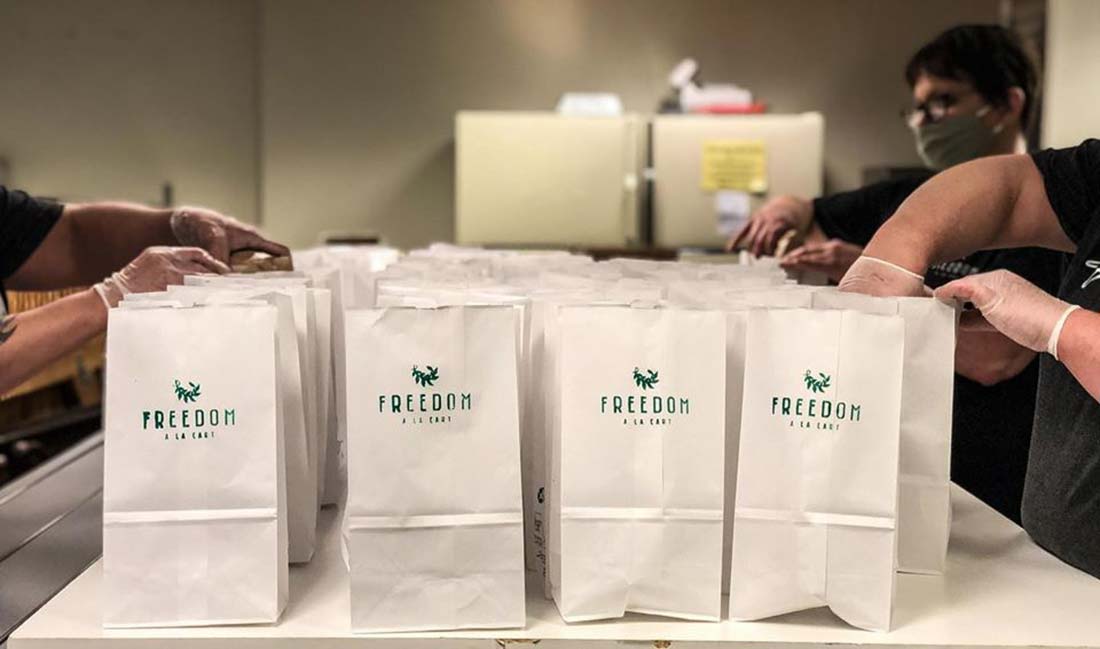
When the pandemic closed down catering, Freedom a la Cart began making sack lunches to feed survivors of human trafficking. Photo courtesy of Freedom a la Cart.
FREEDOM A LA CART: MAINTAINING THE MISSION
Another local catering operation, Freedom a la Cart, faced the same loss of business when large gatherings were banned, government offices sent employees home and churches closed. But Freedom faced two other immediate challenges: Its workforce is women who are survivors of human trafficking, so the operation is not only their job but also part of their support system. On top of that, Freedom’s biggest annual fund-raising event, scheduled for April 25, could not proceed under the state shutdown.
“It was a lot to deal with,” said Paula Haines, executive director. But we started with the focus that we’ve got to keep these women employed, so what can we do to keep this business going?” They lowered the minimum order for their box lunches, added a family meal pack and ramped up delivery.
At the same time, they were reassessing the business model. “We realized that our mission is not to feed the world but to feed survivors,” she said. They started putting together sack lunches with the same sandwiches that made the catering operation so successful over the past decade. The idea was to use the survivors on the staff to make food to help the survivors who use other community support services. They launched the Nourish Our Community fund to raise money for the effort.
Donations started coming in, as well as grants from United Way and the Columbus Foundation. “Now we are delivering 875 meals every week to survivors and their and their children” through several agencies, Haines said. “We’ve also partnered with the Salvation Army to deliver groceries while we’re delivering the meal.”
Soon there were more collaborations. They became a meal provider for the We Are All In This Together campaign, which paid commercial kitchens to make meals to go to health care workers, jobless restaurant workers and families in need. That was another 800 meals a week for the workers to prepare. Freedom also provided meals from Cbus Feeds Our Silent Heroes, a campaign to feed front-line workers at human service organizations, including homeless shelters.
“‘All these things have helped us to keep the kitchen operating. We have not had to lay anyone off and I’m very, very pleased with that,” Haines said.
But there was still the problem of the fund-raising event, Eat Up! Columbus, which annually draws 300 people to a seven-course meal, each course prepared by a different local chef. With no such gathering permitted, the staff decided to throw a virtual event using Zoom instead. “But we wanted to give them an experience that went beyond just tuning in,” she said, leading to a plan to deliver each participant a food kit with charcuterie and drink mix before the call.
The event was a success. It raised $120,000, less than previous years—but with much less in expenses, the net will be about the same. It had an emotional conclusion featuring Gwen England, probation officer for Franklin County’s innovative program known as CATCH Court, which helps women arrested on prostitution charges to get help such as trauma counseling and drug treatment. She sang a song while accompanied on piano by her father, who happens to be Ohio Attorney General David Yost.
Now Haines is looking to the future, knowing that catering sales will likely remain depressed for a long time. There is talk of growing their online sales, perhaps bottling their salad dressings. Freedom is still scheduled to move to a new Downtown headquarters later this year, allowing them to have all their support services on one place. And those services are critical for women in recovery. “Mental health struggles right now are really a challenge for everyone,” she said.
Get details about the organization or donate at freedomalacart.org.
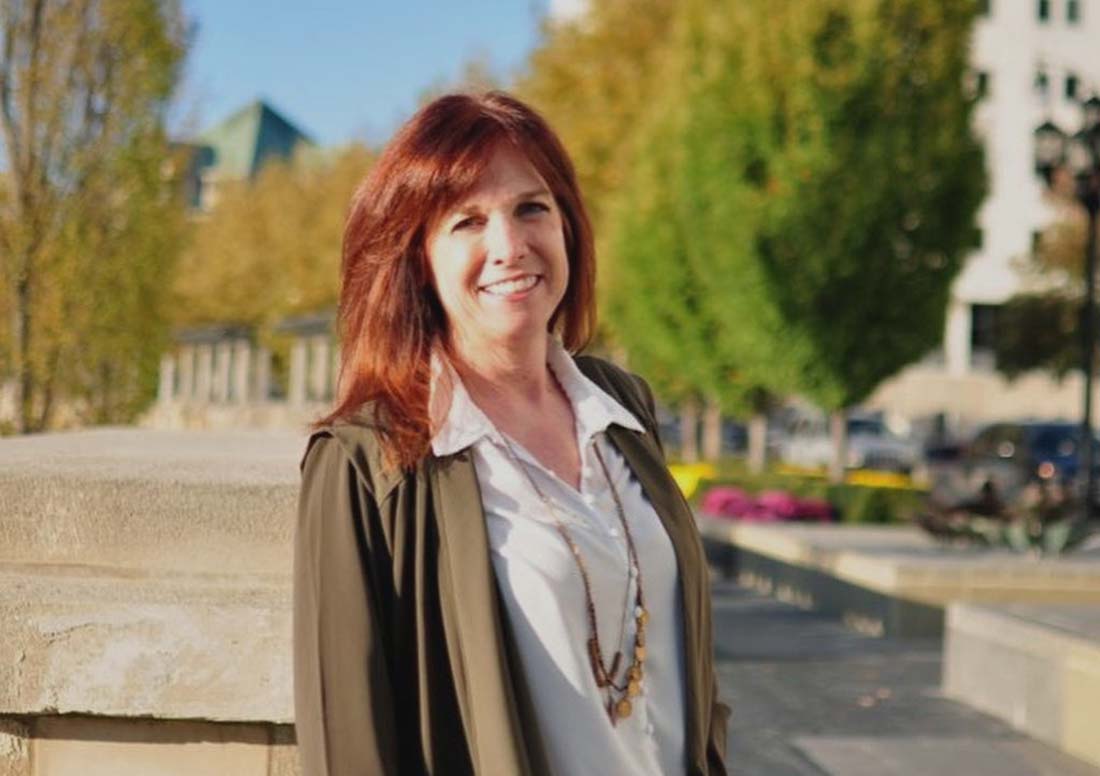
Paula Haines, CEO of Freedom a la Cart. Photo courtesy of Freedom a la Cart.
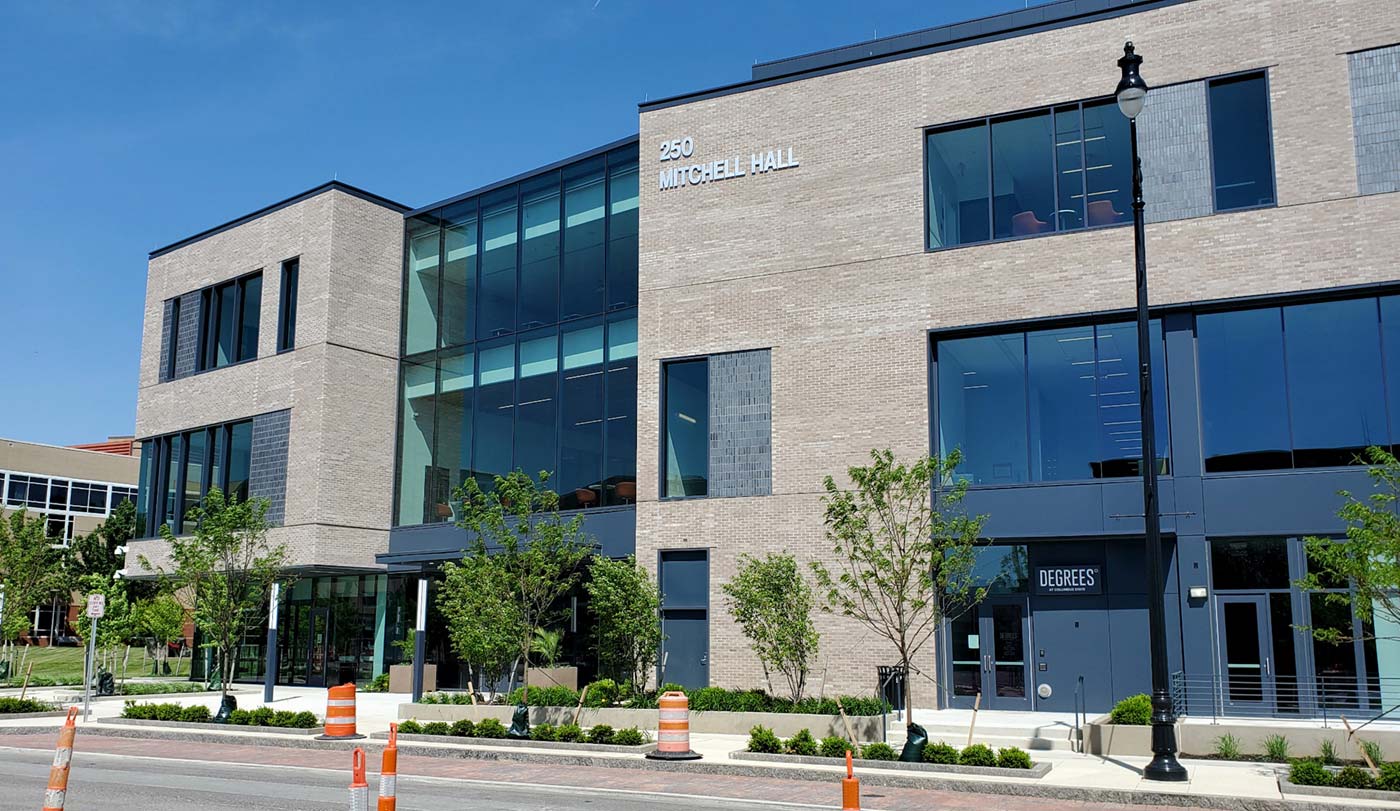
Mitchell Hall, home of the hospitality and culinary programs at Columbus State Community College. Photo by Edible Columbus.
COLUMBUS STATE COMMUNITY COLLEGE: CULINARY PROGRAM PAUSES
Students were still on spring break when they received an email on March 10 announcing that Columbus State Community College would close the campus and move to remote learning.
That works if you are studying history or psychology, but if you’re a culinary student whose classroom is a commercial kitchen, it’s a dead end.
“We had to completely shut down,” said Chef Joshua Wickham, senior director of the School of Hospitality Management and Culinary Arts. “It was devastating because we run 15 to 20 cooking labs a week, and we couldn’t do that anymore.”
Those students in the highly regarded chef apprenticeship program faced another problem. Earning the degree requires you to work 4,000 hours as an apprentice in two years, usually accomplished through a full-time job in a restaurant. “When the restaurants closed, all of our apprentices lost their jobs,” Wickham said. He can understand their frustration better than most—he’s a 2001 graduate of that program. He went on to work in the restaurant world, came back to Columbus State to teach and now heads the program.
The school is housed in a new building, Mitchell Hall, which opened last year and is named for benefactor and restaurateur Cameron Mitchell. The building includes a 100-seat culinary theater, a dozen teaching kitchens, classroom and event space and both a full-service restaurant named Degrees and the Blend bakery and café.
The restaurant opened to the public in late January, providing students with yet another practical training experience. After closing in March because of the pandemic, Degrees will likely not reopen until October, Wickham said. “In the bigger picture, we are not a restaurant, we’re a classroom,” he said. If students return in the fall, as expected, the café could open in August using both its own staff and the restaurant staff to get things up and running.
In the short term, the plan is to start running culinary labs again in late June to let students complete the necessary work. But the labs will be much different with social distancing. Instead of letting students file in and grab the equipment and the ingredients they need from common areas, the staff will need to set up each cooking station with everything that’s needed before the students come in. “It’s going to be a monumental lift to get through this just to get everybody caught up,” Wickham said.
Over the long haul, the program will need to prepare them for a food scene that could be dealing with changes for years, he said. “This situation is forcing everyone in the hospitality industry to think outside of the box and come up with new and creative solutions.”
Learn more about the Columbus State hospitality program at its website.
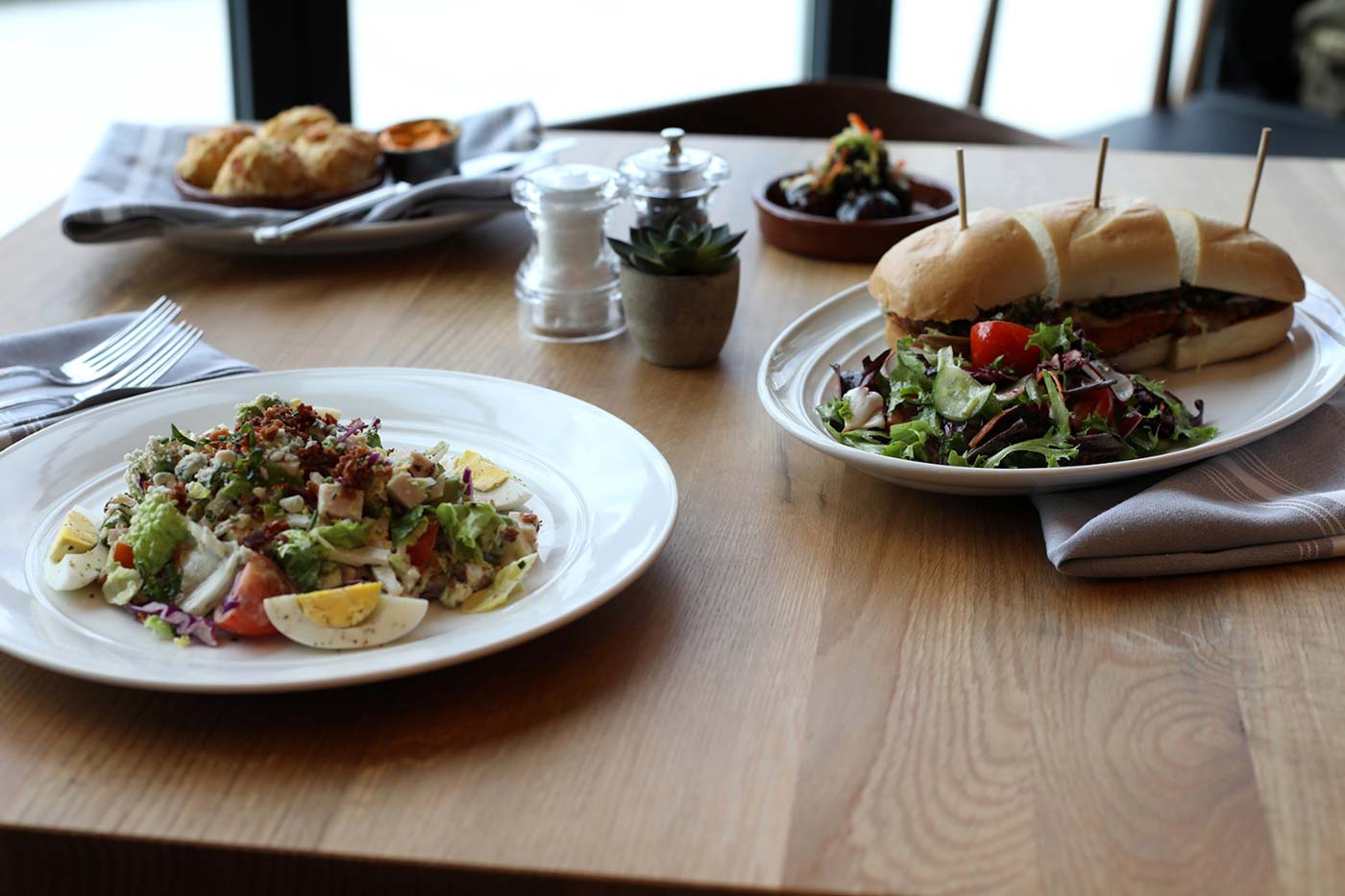 The Degrees restaurant was open for only about six weeks before dine-in service was shut down statewide for the pandemic. Photo courtesy of Columbus State Community College.
The Degrees restaurant was open for only about six weeks before dine-in service was shut down statewide for the pandemic. Photo courtesy of Columbus State Community College.



